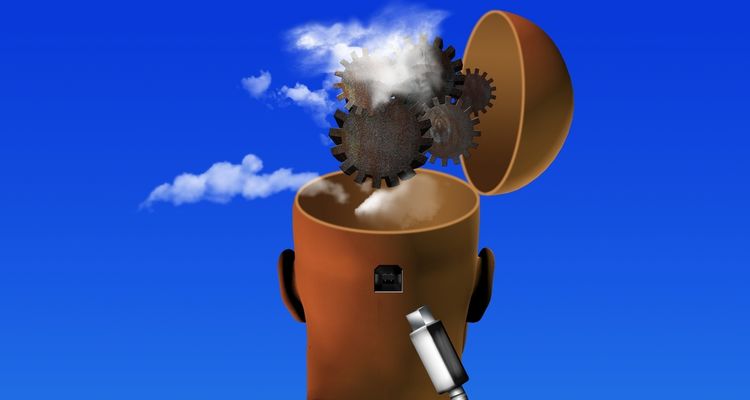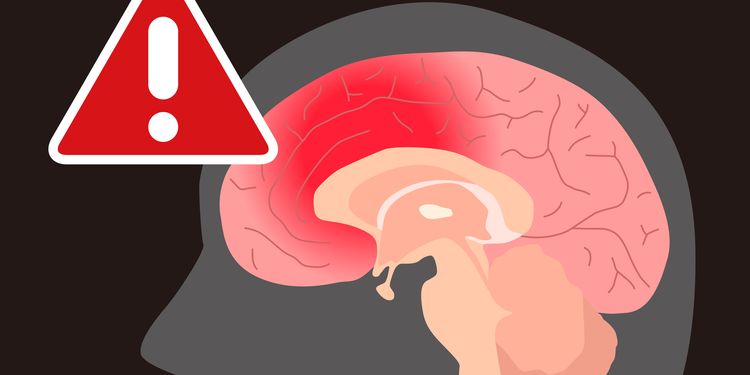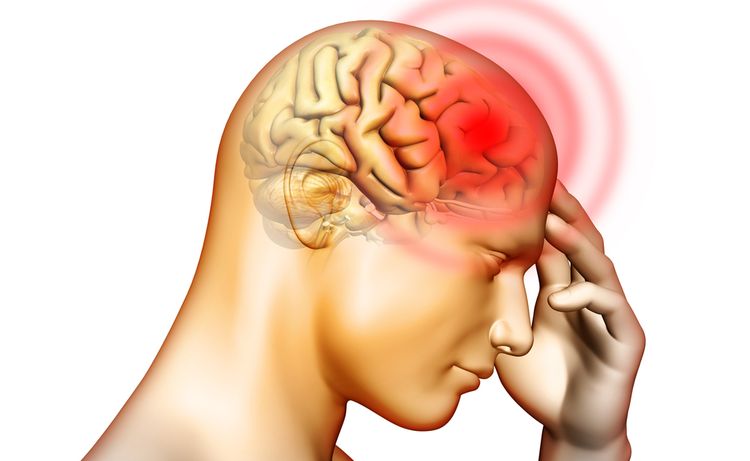Why You Have Brain Fog And How To Clear It Up

You wake up and it’s hard to get out of bed.
And when you do, it’s hard to see straight or think straight and everything’s a bit of a blur.
And then around mid-morning, you zone out and struggle to even pull your thoughts together.
Afternoons can be the worst.
You’ve had your lunch, and all you really want to do is take a nap. It’s not that you’re even so physically tired; it’s more about mental fatigue and having difficulty thinking and focusing. Your brain just isn’t working, and you’ve got that project to finish by the end of the day. Ugh.
We’ve all been able to relate to this at one time or another. However, if this occurs a little too often, it’s a problem that needs to be addressed, because it interferes with your productivity and vitality as a person.

What Exactly is Brain Fog?
Our brain is the crowning organ of the human body. So when it becomes dysfunctional, we definitely need to pay attention and get to the bottom of what’s going on.
Brain fog isn’t recognized as a clinical condition, because testing for it isn’t easy. There’s technically no medical term for brain fog, but it’s as real as real can be for those who suffer with this sometimes debilitating condition.
The loss of mental clarity can be more devastating than the actual disease or condition behind it. It’s the feeling of mental confusion or lack of mental clarity.
It’s called a “fog” because it can feel like a cloud that reduces your ability to think clearly. It can cause a person to become forgetful, detached, and often discouraged and depressed.
Brain fog is associated with short-term memory loss. It’s when you become easily distracted. It’s when you forget plans you or others have made. It sometimes manifests itself through having difficulty in carrying on conversations with people. There may be an inability to remember or retain new information as well.

How Does Brain Fog Occur?
As elusive as brain fog appears to be, there are some very concrete reasons why it’s present and how it manifests.
Genetics: Certain things just shouldn’t happen to young, vibrant teens—like cancer and dying. But some genetic mutations, such as MTHFR and SOD2, may contribute to serious disruption in our body’s ability to detoxify and synthesize nutrients that contribute to mental clarity, like folate and the B vitamins.1
These are faulty enzymes and gene mutations that slow down the methylation process in tissues throughout the whole body. This hampers cellular repair, detoxification, and neurotransmitter production and may impede healthy immune function.
Medical Conditions: There’s a host of medical conditions that are implicated in brain fog. Everything from hypoglycemia to lupus and chronic fatigue syndrome—in fact, most have brain fog as a side effect.

Poor Diet: We’re pretty good at messing up our bodies. In the mornings we get jacked up on coffee, and in the afternoons we have energy drinks to get us through the rest of the day. In the evenings we medicate ourselves with another toxin—alcohol.
Throughout the day we consume foods and beverages that contain sugar or foods that turn into sugar the minute they hit our bloodstream, like breads, bagels, pizzas, and most desserts.
Our blood glucose and insulin levels are on a perpetual roller coaster, and the end result is brain fog.
Lack of Sleep: We’re a chronically sleep-deprived people. Let’s face it, most of us don’t get the 7.5-8 hours of sleep our bodies need for repair and restoration.
Dehydration: There are times when we just don’t get enough water. Exercise is a big one, because sweating and losing electrolytes without replenishing them can cause a serious case of brain fog.2
Stress: Occasional stress is a part of life, but chronic stress definitely can’t be if you intend to be healthy. Stress drains the brain.

Inflammation: At the end of the day, what all the causes of brain fog have in common is inflammation.
Datis Kharrizan, author of Why Isn’t My Brain Working?, explains that brain fog is a sign of a leaky brain, or a brain on fire. In other words, brain fog is a sign of inflammation.
Inflammation in the brain causes neurons to fire more slowly, slowing down mental acuity, recall, and reflexes. Sluggish neurons also slow down the production of energy in the cells. This means cells fatigue easily, and you lose your ability to focus for long periods of time.
There’s an immune system in your brain, and it’s composed of microglia. Microglia turn on and release inflammatory messages when:
- There’s poor blood circulation to the brain.
- There’s inflammation outside the brain, such as an inflamed gut.
- Environmental pollutants, perfumes, and chemicals have crossed the blood/brain barrier.
Toxins are lipophilic, which means they like fats. Our brain is mainly composed of fats, which is why certain toxins affect the brain to such a high degree.3

Besides inflammation in the brain, there’s inflammation that runs throughout our entire body. It’s caused by oxidative stress, or too much superoxide.4
Superoxide is a highly reactive form of oxygen. Too much superoxide burns up our mitochondrial enzymes and membranes, thus impairing mitochondrial function. This then causes even more oxidative stress and inflammation, leading to a vicious cycle.
Dr. Mansour Mohamadzadeh, director of the Center for Inflammation and Mucosal Immunology at the University of Florida, explains that inflammation is your body’s response to outside threats.
These include stress, infection, toxic chemicals, a virus or bacteria, an autoimmune disorder, sugar, gluten, bad fats, and foods you may be allergic to.

Symptoms of Brain Fog
Acute Symptoms: This kind of brain fog is connected with random occurrences that aren’t lasting in nature, such as dehydration, lack of sleep, and a holiday overdose of food (especially desserts and sweets).
Students crashing for exams or projects with little or no sleep also fit in here. This type of brain fog is transitory, and once the triggering situation or time is over, the symptoms will no longer manifest themselves.
Chronic Symptoms: Brain fog that never really seems to go away. At the root of this are conditions and diseases such as fibromyalgia, lupus, Lyme disease, chronic fatigue syndrome, food allergies such as Celiac disease, and many others.
Many of these diseases can retreat into remission, and during those times the brain fog will lessen, but it will never entirely go away.
Relapsing Symptoms: Brain fog that occurs with hypoglycemia, diabetes, bowel toxicity, and hormonal imbalances isn’t necessarily permanent, but as the condition ebbs and flows, so does the brain fog. Some types of stress also fit in here.

Types of Brain Fog
Virus-Induced: Some people who fall prey to viral infections suffer brain fog as a result. The Epstein Barr virus is just one of many possibilities.8
Gastrointestinal Infections: This category includes but is not limited to yeast infections, such as Candida albicans and SIBO (small intestinal bacterial overgrowth).
In fact, almost anything to do with the gut, including leaky gut, can be a major source of brain fog.9 Anybody with brain fog after antibiotic treatment should look into Candida albicans as the cause. People with candida and bacterial infections will often have chronic brain fog.
Self-Induced: This type comes from bad food choices and a bad diet. When you start your day with high-carb foods and then continue making bad food choices all day long, such as a high-carb lunch (pizza, a soda, a sandwich on a sub roll, chips, French fries, etc), you’re in for an afternoon crash and semi-comatose state of mind—brain fog on steroids.
Nights without much sleep that mess with your circadian rhythm and the energy drink/alcohol cyclical madness all are self-induced.
Hormonally-Induced: Menopause, PMS, Hashimoto’s disease, hypothyroidism, and adrenal fatigue are just a few conditions that have brain fog as a side effect.4
Psychologically-Induced: This is a broad spectrum that can run the gamut from emotional instability to head trauma from an accident. There are brain tumors, PTSD, ADD, ADHD, autism, and a host of other neurological conditions that result in brain fog.
Bacteria-Induced: Bacteria are nasty, and they do nasty things to us. Diseases like meningitis and encephalitis are bacterially-induced conditions that result in real brain disorientation. Alzheimer’s has a strong connection with bacteria, as do multiple sclerosis, depression, fibromyalgia, and dozens of other diseases. Even parasites are implicated in brain fog.5,6,7

Age-Induced: Getting older can be a bummer. You forget things, you lose your keys, you meet someone and minutes later can’t remember their name.
It’s rather simplistic to blanket this under “age-induced,” as it’s truly other complex mechanisms going wrong in the body.
Really it’s a matter of an accumulation of oxidation and aging in the mitochondria, shortening of telomeres, and metabolic pathways breaking down and not functioning properly anymore. And as the fog in the harbor rolls in, so does the brain fog in an aging brain.10

Root Causes of Brain Fog
Brain fog comes with so many root causes that it’s impossible to list them all. We are however going to cover the most prevalent.
Heavy Metal Toxins: When heavy metals cross the blood/brain barrier, they can do some serious collateral damage, including a significant hit on cognitive function.21
Bowel Toxicity: The gut and human microbiome have often been called the second brain, and for good reason. The gut and brain affect one another immensely, for better or for worse.
Food Reactions: Many types of food are implicated in brain fog. Grains and cereals can cause not only brain fog, but also depression and other neurological manifestations.22
Nutrient Deficiencies: The brain requires many nutrients, like proteins, high-quality fats, vitamins, and minerals. If they’re missing, their absence can cause huge problems with clarity of thinking and memory.
MTHFR Polymorphisms (Faulty Methylation Pathways): This sounds like a major Scrabble word, but it can be distilled down into simple terms: genetic predisposition. Some people are genetically prone to brain fog.

Pharmaceuticals: The big bad world of pharmaceuticals can definitely be at the crux of brain fog for some people.
Inactivity/Sedentary Lifestyle: You’ve heard it before—“Move it or lose it.” This couldn’t be truer for the brain. A lack of exercise causes a lack of much-needed oxygen to this vital organ.
Dysbiosis: Dysbiosis is when there’s an unhealthy change in the normal bacterial ecology in the intestines (gut microbiota) or oral cavity. An imbalance in gut health, whether it’s leaky gut (intestinal permeability), gut dysbiosis, or IBS (irritable bowel syndrome), increases autoimmunity and inflammation, thus contributing to brain fog.23
Stress: Stress is a big contributor to brain fog and impairment of cognitive function in general, so watch out and take some time to relax.
Hormone Imbalances: Lack of hormones, too many hormones, and an imbalance of hormones are all equally important in the development of brain fog.

Root Cause: Heavy Metal Toxicity
Toxic metals can be highly disruptive and cause serious brain fog. We run into lots of types of heavy metals through our food, as well as what we put on our bodies (shampoo, lotion, etc).
Excessive or biounavailable copper is strongly associated with feelings of confusion, disorientation, racing thoughts, mood swings, and confusion.
Copper imbalance can be very hard to diagnose, and for women, the use of birth control pills or patches only exacerbates the issue. Unfortunately, a vegetarian diet tends to be high in copper and low in zinc, an important mineral that balances copper.24
Other toxic metals include mercury, aluminum, cadmium, and lead. Most everyone has some of these metals in their cells nowadays.
Mercury toxicity is extremely common, as the metal is found in large predatory fish like marlin, shark, and swordfish, as well as silver dental amalgams. Aluminum is found everywhere—table salt, drinking water, antiperspirants, antacids, and many cosmetics.25

Metals affect the brain in various unhealthy ways. For example, lead does damage to the cerebellum, prefrontal cortex, and hippocampus—where memory happens. It also alters the process of synaptic formation and damages the myelin sheaths.26
Heavy metal ions form complexes with proteins and generate carboxylic acid groups. These molecules lose their ability to function properly, resulting in the malfunction or death of cells.
When heavy metals bind to these groups, they inactivate important enzyme systems, resulting in the formation of free radicals—dangerous chemicals that cause the oxidation of biological molecules.27
There are many other toxins as well. Chemicals are everywhere—in our car interiors, upholstery, plastic containers, lawn chemicals, paints, ink, pesticides on food, and more.

Root Cause: Bowel Toxicity
Improperly digested food rots, putrefies, and ferments in the intestines. It slows down, and instead of taking 8-20 hours to pass through, this food can require 2-3 days.
This encourages an imbalance of bacteria and yeast, and candida or other nasties can take over the turf from the probiotics that should live there.
These poison the liver and other organs, but some can migrate to the brain and cause symptoms of brain fog.28
Causes for bowel toxicity include antibiotics, antacids, and an improper diet containing sweets or too much fruit.29 Most fruit is sprayed with pesticides, which can also definitely affect the brain.

Root Cause: Dysbiosis
Dysbiosis is a condition where non-infectious host microorganisms interact adversely with our body and its natural microbes.
Dysbiosis can affect the gastrointestinal, oral, sinus, genitourinary, and dermatologic regions of our body.
General dysbiosis with a high prevalence of gram negative bacteria will produce brain fog. Gram negative bacteria are resistant to drugs and are increasingly resistant to most antibiotics.
According to Dr. Sara Gottfried, these bacteria have built-in abilities to find new ways to be resistant and can pass along genetic materials that allow other bacteria to become drug-resistant as well. Some of these bacteria can be found in conditions like Lyme disease, B. Pertussis, cystic fibrosis, pneumonia, urinary tract infections, gingivitis, peptic ulcers, food poisoning, and respiratory infections, to name just a few.

Root Cause: Food Reactions
Eating the wrong kinds of food is one of the biggest causes of chronic brain fog, but no single food is a bigger player in causing and sustaining it than wheat.30
In his book Wheat Belly, Dr. William Davis explains how today’s semi-dwarf wheat contains a modified gliadin protein as a result of hybridization that has a devastating impact on our cognitive faculties. This leads to chronic brain fog while also stimulating appetite.
No wonder when people give up wheat, the first things they report are increased mental clarity, reduced fatigue, and weight loss. Wheat affects the brain in another way—it contains a natural opiate called gluteomorphin, which causes an addiction to wheat that keeps us coming back for more.
Another food responsible for brain fog (and which contains natural opiates called casomorphins) is dairy. “Oh, I just can’t give up cheese!” Yup, there’s some truth to that, says J.J. Virgin. She goes on to say that foods should give us energy. But when you continue to eat foods you have a sensitivity to, it creates an inflammatory and immune response.
So not only are you not getting energy from the foods you’re eating, but because your body has a reaction to them, the digestive tract has to work overtime to try to eliminate them.

Lurking in our foods are all the chemicals involved in processing them. Herbicides and pesticides are used in the growing process.
Glyphosate is one of the major ones, because it’s sprayed on wheat crops at the time of harvesting. Glyphosate is correlated with many diseases and neurological disorders, including brain fog.31
Perchlorate is also a big concern, and Scientific American wrote a report on how we just can’t escape it. It’s both naturally-occurring and chemically-generated, and we use it for rocket fuel, missiles, fireworks, flares, and explosives. It’s in our soil, water, and plants and has found a permanent home in our food chain.
Eleven million Americans live in areas where concentrations of perchlorate in public drinking water supplies are significantly higher than what’s considered safe. And yes, you got it, brain fog is implicated in perchlorate consumption.
Lectins are abundant in raw legumes, especially soy and grains, but we can also find it in dairy products and certain vegetables from the nightshade family (eggplant, tomatoes, potatoes, peppers).

Lectins in plants are a defense mechanism against microorganisms, pests, and insects. They’re resistant to human digestion, and they enter the bloodstream unchanged.32
Soy lecithin and other soy products are high on the allergy watch list. 99% of soy grown in the USA is a GMO. Soy is also a phytoestrogen, which means it can be a factor in breast cancer. As an allergen, it causes brain fog.
Aspartame is found in over 5,000 products and affects 25% of Americans. It causes dizziness, fatigue, depression, and brain fog.33
There are countless chemicals in our environment that have a negative effect on our brain. Needless to say, we have to do what we can to minimize the toxic load. Educate yourself, read labels, and as much as possible, eat foods as found in nature.

Root Cause: Nutrient Deficiencies
There are certain micro- and macronutrients that are essential to our mental well-being. They’re needed for enhancing our memory, and they keep us sharp, focused, and alert when we need to be.
Vitamins E, B12, folate, B1, B2, B6, choline, magnesium, vitamins C and D, and omega-3 fatty acids are some of the key players in brain function. In addition, protein and fats are very important for our mental alertness.35
Nutrient deficiencies unfortunately abound in our society; we don’t have the same levels of vitamins and minerals we had even fifty years ago.
It’s a well-known fact that Americans (and for that matter, people the world over) are deficient in vitamin D. Reports also indicate widespread magnesium deficiency in over 80% of Americans.
Vegetarianism over a long period of time can contribute to brain fog. Those that adhere to this lifestyle aren’t getting the essential B vitamins found in meat products, which are crucial for brain and mood health.36

Root Cause: MTHFR Polymorphisms
This word’s definitely a Scrabble winner, but it’s too important and too prevalent to skip over.
The acronym stands for methylenetetrahydrofolate reductase.
The MTHFR gene is a polymorphism, or what’s seen as a genetic variance.
One in every two people may have this variance (that’s half the population) according to a Life Extension Foundation synthesis based on five demographic studies.
The MTHFR gene instructs the body to make an enzyme necessary to convert vitamin B9, or folic acid, into its usable form. In the case of a MTHFR mutation, this inability to process folic acid can have serious effects. Folate deficiency can result in lethargy, impaired cognitive function, mood disorders, and most certainly brain fog.37

Root Cause: Pharmaceuticals
Who hasn’t taken an allergy medicine like an antihistamine and felt like they were in a daze? This one’s easy—you should be weary of brain fog anytime a drug starts with “anti.” These include antihistamines, antidepressants, antipsychotics, antispasmodics, and antihypertensives.
Statins are notorious for affecting the brain, particularly the memory. According to Drs. Bowden and Sinatra of The Great Cholesterol Myth, these cholesterol-lowering drugs might be the single worst group of drugs for your brain.
Your brain is 60% cholesterol, after all. Cholesterol is necessary for memory, learning, and fast thinking, so it’s no surprise that a cholesterol-lowering drug can have a negative impact on your brain.38
Watch out for over-the-counter (OTC) medications, as many of them are implicated in memory loss. Everything from Advil PM to Zantac can do serious damage to your gray matter. Sleeping pills are a disaster for your brain, as they’re well-known to cause forgetfulness and brain fog.

Root Cause: Lack of Exercise
Exercise is key for healthy cognitive function in so many ways.39 One of the most basic is oxygen. Our brain requires a major dose of oxygen—in fact, it needs 20% of our body’s supply.
When you exercise, you increase your oxygen flow, but when you don’t, you decrease it. In fact, many people have short, shallow breathing due not only to lack of movement but also to worry, fear, and stress.
When we exercise, we experience more cell growth in the hippocampus, that part of our brain responsible for learning, memory, and alertness.40
Doing something like ballroom dancing demands both physical activity and mental acuity, demanding a higher impact on cognitive function. This all helps to keep brain fog at bay.
The University of Iowa conducted over one hundred studies on exercise and concluded that strength training helps to keep you sharply focused; while you’re pumping that iron, you’re counting and focusing on proper breathing and form.

Root Cause: Stress
Stress is one of the biggest underlying causes for brain fog and the inability to think clearly and properly. Some of the earliest studies conducted on the connection between stress and cognition go back to World War II.
An observation was conducted on pilots who were highly skilled during peacetime, but due to the stress of battle they often crashed their planes because of mental errors. It was observed that their cognitive ability—their ability to perform tasks with flexible thinking—was impaired by stress.41
Stress puts you at greater risk for just about every major disease, including brain diseases. Prolonged stress leads to poor decision-making, memory loss, and brain fog.
Daniela Kaufer of UC Berkeley did a series of experiments proving that chronic stress causes the body to produce fewer neurons and an excessive amount of myelin white matter, “which disrupts…communication in the brain.”

Root Cause: Hormonal Imbalance
As if going through menopause itself isn’t rough, some of the symptoms that occur because of it are even less desirable. Take, for example, hot flashes.
85% of women going through menopause (and even for some years after) experience hot flashes. They may seem innocuous enough. Your upper body has a “flash” of heat for a period of time. Maybe you sweat a bit, maybe you don’t. The episode originates in the brain as a direct response to hypoestrogenism in the thermoregulatory center of the hypothalamus.41
This is directly correlated with memory impairment, decreased mental clarity, verbal memory problems, also a slowdown in the speed of mental processing. How many times have you heard a woman going through menopause saying, “I feel like I’m losing my mind!”
Hormone imbalances can wreak havoc on brain chemistry and communications between brain cells. According to Dr. Klaiber, “Estrogen, progesterone, testosterone, and the thyroid hormones are as essential to our cognitive abilities as food-based nutrients are to our basic cellular function.”42

Natural Relief from Brain Fog
Depending on what the cause of your brain fog is, there’s a lot of help out there for you, so don’t despair.
Clean up your diet and get rid of gluten (that would be wheat, oats, barley, rye, and spelt). The connection between the proteins gliadin and glutenin and brain dysfunction is very well documented.11
Ditch the sugar, as it can be a neurotoxin.12
Feed your body foods as they’re found in nature, especially nutrient-dense foods and healthy fats like coconut oil, avocado, fatty fish, egg yolk, and ghee.
Ketogenic Diet: In some cases, especially with epilepsy and other more serious neurodegenerative diseases, this diet can be remarkably helpful, especially with clarity of thinking. Our brain craves lipids and is mostly made up of cholesterol. A ketogenic diet is heavy on proteins and fats, with very few carbohydrates.13
Heal the Gut: The brain’s health is completely and inextricably linked to the gut, and specifically to the communal symbiotic relationship of good and bad bacteria.

A destroyed or impaired microbiome can cause quite a bit of harm to our bodies. Brain fog and more serious neurological problems are among the most commonly seen symptoms of this imbalance.14
Prebiotics and probiotics are necessary to heal the gut. Prebiotics prepare the intestinal environment for probiotics, which help to heal the gut. Prebiotic foods include raw chicory root, raw dandelion greens, raw garlic, raw or cooked onion, raw leek, and raw asparagus.15
Detoxify: This is absolutely essential. Heavy metals and other neurotoxins are very much implicated in brain fog, and the only way to flush them out is through a thorough detoxification program.
Supplements like liposomal glutathione, milk thistle, curcumin, a good fiber like psyllium husk, probiotics, chlorella, and spirulina are great options. Getting into a far-infrared blanket or sauna on a regular basis will do wonders for detoxifying too.16
If that’s difficult, hot baths with Epsom salts and essential oils such as peppermint, eucalyptus, wintergreen, and fennel are a good choice. Massage will help to release toxins as well.

Chiropractic: New studies from the Upper Cervical Research Foundation indicate that upper cervical adjustment removes interference to the nervous system and brain.
Reflexology: One of the main treatment options for brain fog is daily reflexology. This system pinpoints target areas in your body, utilizing a massage-based system to promote the removal of wastes, thus aiding in healing brain fog.
Sleep: Not sleeping well is one of the most common causes of brain fog.17 If you have sleep apnea, that will almost certainly be the cause of your brain fog. Sleep apnea causes hypoxia, or a lack of oxygen at night, thus increasing reactive oxygen species, or oxidative stress.18
Exercise: Unfortunately, the majority of Americans don’t take exercise seriously enough. Many of our current maladies would be helped, if not corrected, if we only got off our butts and exercised on a more regular basis.19,20
